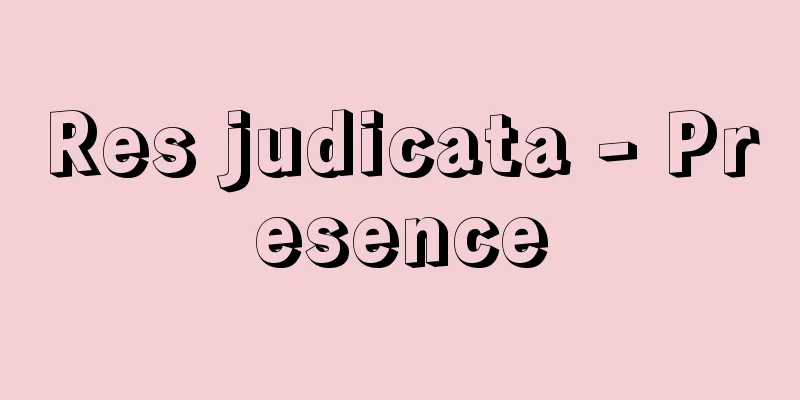Res judicata - Presence

|
The court's decision is final and binding on subsequent courts and the parties involved. This rule is recognized in both civil and criminal trials. [Yoshinobu Homma] Res judicata in civil trialsCivil litigation aims to resolve disputes between citizens. Therefore, when a judgment is issued as the standard for resolving a dispute and becomes final (a final judgment), the contents of the judgment cannot be disputed. This is called res judicata. Thereafter, the parties cannot assert anything that contradicts the res judicata, and the court cannot make a different decision. This is called the effect of res judicata. A final and final judgment has res judicata effect, but arbitration awards also have res judicata effect. There is dispute as to whether or not res judicata effect is recognized for records of waiver/acceptance of claims and records of settlement. [Yoshinobu Homma] Standard TimeRes judicata determines the existence or non-existence of rights and obligations at the last point when the materials for the trial can be presented (at the end of oral argument in the trial). [Yoshinobu Homma] Objective ScopeThe only thing that can be determined by res judicata is the judgment on the rights and obligations (= the subject of the lawsuit) that the plaintiff presented as the subject of the dispute (included in the main text; Civil Procedure Act, Article 114, Paragraph 1). For example, in a judgment that confirms the plaintiff's acquisition of ownership of an object as a result of a sales contract, or a judgment that grants a claim for eviction based on the ownership of a house, res judicata only applies to the judgment that grants the plaintiff's ownership or the right to claim for eviction, but does not apply to the judgment on the validity of the sales contract or the existence of the ownership of the house (judgment in the reasons for the judgment). The objective scope of res judicata varies depending on how the subject of the lawsuit is perceived. In addition, res judicata is granted as an exception to judgments on offsetting (Civil Procedure Act, Article 114, Paragraph 2), and furthermore, as an interpretation theory, there is a strong argument that it should be recognized as binding in the form of issue effect (the effect that the parties in a lawsuit dispute as the main issue, and the judgment on the issue that the court has heard and rendered after examining it cannot be denied in a later separate lawsuit. In the above example, the judgment on the validity of the sales contract or the existence of the ownership of the house). [Yoshinobu Homma] Subjective rangeSince civil litigation is a relative resolution of disputes between private individuals, and since it is the parties who provide the materials for the judgment, res judicata in principle only exists between the parties. For example, even if it is determined that the ownership of a house belongs to A between A and B, C and D, who are not parties to the litigation, can claim their own ownership of the same house regardless of that. In exceptional cases, it may extend to persons other than the parties. For example, after a land tenant Y who owns a building on leased land loses a lawsuit against the land lessor X for the removal of the building and eviction of the land, person Z who acquired the building on the leased land from Y is bound by the effect of the judgment and must remove the building and vacate the land (successor after the conclusion of oral argument; Article 115, paragraph 1, item 3 of the Civil Procedure Act). Or, if some of the shareholders of a corporation file a lawsuit to cancel a resolution of the general meeting of shareholders and win the lawsuit, the other shareholders who are not parties to the lawsuit cannot challenge the effect of the judgment (Article 838 of the Companies Act). [Yoshinobu Homma] Res judicata in criminal trialsThere are various academic theories regarding the basis and content of res judicata in criminal proceedings. The traditional central idea was that once a trial is established on the substance of a case (guilty or innocence), the content of the declaration of intent (judgment) comes to have the effect of a concrete norm (normative effect = substantive determinative force), which is externally manifested as the effect of res judicata = double jeopardy. However, recently, the view that the effect of double jeopardy is positioned as a policy effect based on Article 39 of the Constitution of Japan (the principle of double jeopardy) and is separated from res judicata has become more prevalent. This is because the subject of trial in the Code of Criminal Procedure is the cause of action (Article 256), and if the effect of double jeopardy were to extend beyond the cause of action to the scope of "the identity of the facts of the indictment" (Article 312, paragraph 1), this would be inconsistent with the idea that it arises from "having already been adjudicated." This view still places res judicata in the theory of judicial effect, but not as a normative effect, but as an institutional effect. In other words, as in the case of civil procedure, it is positioned as an irrevocable effect on final judgments in general, derived from the function of a lawsuit as a public judgment. This effect is submerged in the effect of the rule of no double jeopardy in substantive trials, but in formal trials, it has the practical benefit of blocking relitigation of the same cause under the same factual circumstances. [Oide Yoshitomo] [Reference items] | | |Source: Shogakukan Encyclopedia Nipponica About Encyclopedia Nipponica Information | Legend |
|
裁判所の判断が最終的なものとして、後訴裁判所・当事者を拘束する効力。民事裁判、刑事裁判ともに認められる。 [本間義信] 民事裁判における既判力民事訴訟は、市民相互間の紛争の解決を目的としている。したがって、紛争解決の基準として判決が出され、確定した場合(確定判決)には、判決内容は争えないとしなければならない。これを既判力という。以後、当事者は既判力と矛盾することを主張できないし、裁判所も異なる判断をすることはできない。これを既判力の効果という。確定終局判決は既判力を有するが、仲裁判断も既判力をもつ。請求の放棄・認諾調書、和解調書については既判力が認められるか否かについて争いがある。 [本間義信] 標準時既判力によって確定されるのは、裁判の材料を提出できる最後の時点(事実審の口頭弁論終結時)における権利・義務の存否とされる。 [本間義信] 客観的範囲既判力をもって確定されるのは、原告が争いの対象として提示した権利・義務(=訴訟物)についての判断に限られる(主文に包含するもの。民事訴訟法114条1項)。たとえば、売買契約の結果、原告がある物の所有権を取得したとしてその所有権を確認する判決、または家屋の所有権に基づく明渡し請求を認める判決で既判力を生じるのは、原告の所有権、または明渡し請求権を認める判断についてだけで、売買契約の有効性、家屋の所有権の存在についての判断には、既判力が生じない(判決理由中の判断)。既判力の客観的範囲は、訴訟物をどのようにとらえるかにより異なってくる。また、相殺に対する判断については例外的に既判力が認められ(同法114条2項)、さらに解釈論として争点効(訴訟で当事者が主要な争点として争い、裁判所がこれを審理して下したその争点についての判断を後の別の訴訟で否定することはできない、という効力。前記の例では、売買契約の有効または家屋の所有権の存在の判断)という拘束力を認めるべきだとの主張が有力である。 [本間義信] 主観的範囲民事訴訟は私人間の争いを相対的に解決するものであるから、また、判決の材料を提供するのは当事者であるから、既判力は原則として当事者間に限って生じる。たとえば、A・B間で家屋の所有権がAのものであることが確定しても、訴訟の当事者でないCやDはそれとはかかわりなく、同一の家屋について自己の所有権を主張できる。例外的に、当事者以外の者に及ぶ場合もある。たとえば、借地上に建物を所有する土地の賃借人Yが、土地の賃貸人Xの建物収去土地明渡請求の訴えに敗訴した後に、借地上の建物をYから譲り受けた者Zは、判決の効力を受け、建物を収去し、土地を明け渡さなければならない(口頭弁論終結後の承継人。民事訴訟法115条1項3号)。あるいは、株式会社の株主の一部の者が、株主総会決議取消しの訴えを提起し、勝訴した場合、当事者になっていない他の株主も、その判決の効力を争えない(会社法838条)。 [本間義信] 刑事裁判における既判力刑事訴訟における既判力については、その根拠や内容に関し、学説上さまざまな考え方がある。従前の中心的な考え方は、事件の実体(有罪・無罪)についての裁判が確立すると、その意思表示(判断)内容が、具体的規範としての効力(規範的効力=実体的確定力)をもつに至り、それが外部的に既判力=一事不再理の効力として発現するとされていた。しかし、最近では、一事不再理の効力を日本国憲法第39条(二重の危険の法理)に基づく政策的効力と位置づけ、既判力から切り離す見解が有力である。というのは、刑事訴訟法が審判の対象を訴因としているため(256条)、訴因を越えて「公訴事実の同一性」(312条1項)の範囲に一事不再理の効力が及ぶとすると「既に判断された」ことによって生ずるとする考え方とは矛盾をきたすからである。この見解は既判力をなお裁判効力論のなかに位置づけるが、それは規範設定的効力としてではなく、制度的効力としてである。すなわち、民事訴訟法におけると同様、公権的判断としての訴訟の機能から導き出される終局裁判一般の訴訟への不可変更的効力として位置づけられる。この効力は、実体裁判では一事不再理の効力のなかに埋没してしまうが、形式裁判にあっては同一の事実状態で同一訴因の再訴を遮断するという実益がある。 [大出良知] [参照項目] | | |出典 小学館 日本大百科全書(ニッポニカ)日本大百科全書(ニッポニカ)について 情報 | 凡例 |
>>: Motor sailing ship - Kihansen
Recommend
4-Aminophenol
…Aniline black is also used as a black organic pi...
One person role - Ichininyaku
〘noun〙① Having average skills. Being able to work ...
photoelectromagnetic effect
...When a magnetic field is applied perpendicular...
Kaaba - Ka'ba (English spelling)
A cube-shaped temple in Mecca on the Arabian Peni...
Enoch Arden
…His next work, Maude (1855), was an ambitious wo...
Uemura Castle Ruins
...Agriculture and forestry are the main industri...
Yoshimine Temple
A Tendai sect temple located in Oharano Oshio-cho...
Teresa de Jesus (English spelling)
…Other important works by Cervantes include the t...
Inazo Nitobe - Nitobe Inazo
Educator and agricultural policy scholar. Born in...
kobus
…It is also a similar instrument to the Tibetan d...
Fake academic and party affiliation
…In 1194 (5th year of Shaoxi, Zhu Xi was 65 years...
Disse space (English)
…Reticular fibers form a network of connective ti...
Flower Whale - Shadow
〘Noun〙 ("Hana" is a flattering name, and...
Love Song - Love Song
〘 noun 〙 (a noun derived from the conjunctive form...
Aussig an der Elbe (English spelling) AussiganderElbe
…An industrial city developed at the confluence o...









